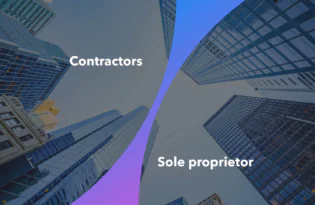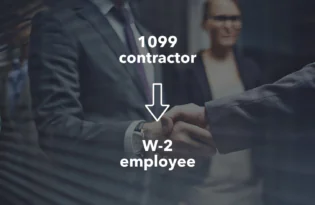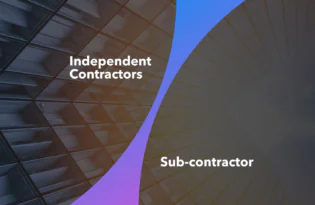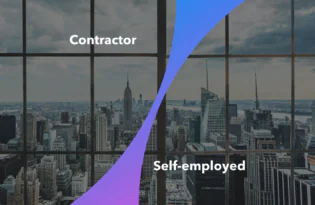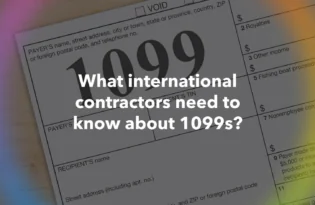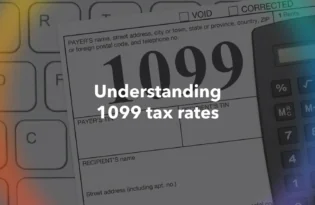Do 1099 employees get benefits: Understand the difference between W2 and 1099 employees
Do 1099 employees get benefits? What is the difference between W-2 and 1099? Explore the blog to learn 1099 employee benefits in detail.
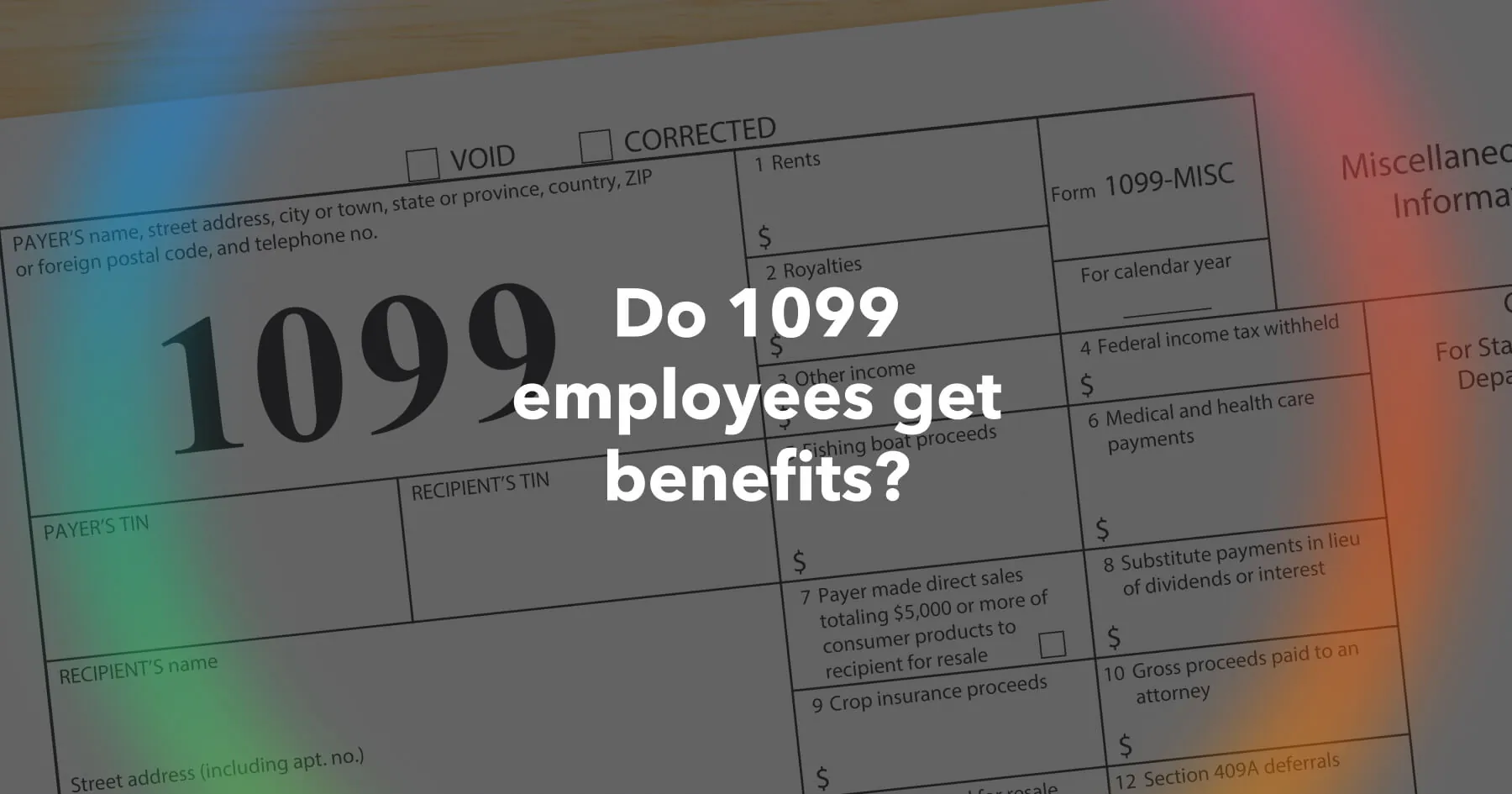
Business operations are undergoing significant transformations with the rise of the gig economy. According to a survey, it is projected that there will be 86.5 million freelancers operating in the United States of America by 2027. This will account for almost 50.9% of the country’s total workforce.
The majority of teams in an organization are now a mix of traditional employees (W-2) and independent contractors, often referred to as 1099 employees. Despite the rich pool of talent and good performance rates, 1099 employee benefits are limited.
One of the most common questions that is usually asked is, ‘Do 1099 employees get benefits like W-2 employees?’
This article explores whether 1099 employees are eligible for benefits from the employer. Payoneer Workforce Management is a trusted EOR platform that helps businesses stay compliant with simplified payment operations and supports localized benefits, if applicable.
What is a 1099 employee: Understanding the difference between W-2 and 1099
Before we delve into the question of whether 1099 contractors can get employer benefits, let us understand the difference between W-2 and 1099 employees.
A W-2 employee is a general employee in the United States who is part of the employer-employee relationship. The employer controls the performance of the W-2 employee directly. On the other hand, a 1099 employee is a contractor or freelancer hired by a company to complete a specific project or job.
Here is a comparison between the two kinds of employees:
| 1099 Employees | W-2 Employees |
|---|---|
| These professionals can take up work from more than one employer/client. | A W-2 employee works under a single employer. |
| 1099 employees are contractors/freelancers. | W-2 employees are full-time employees in an organization. |
| 1099 employees decide their mode of working, including the number of work hours. | The employer decides how the W-2 employees will work. |
| 1099 employees work directly by understanding the project requirements without any training. | W-2 employees undergo an onboarding process in the company along with extensive and rigorous training. |
| In the majority of cases, 1099 employees are not entitled to any benefits from their employer, such as healthcare or retirement contributions. However, some employers may provide certain benefits to 1099 employees, depending on local laws and agreements.. | W-2 employees are covered by local labor laws and are eligible to receive statutory benefits from their employer. |
| Receive the payment after the completion of the project/assignment as per the clauses in the contract agreement. Some 1099 contractors also receive hourly payments. | These employees are entitled to a salary from the employer, which can be on a weekly, bi-monthly, or monthly basis. |
| There are no tax responsibilities of the employer for a 1099 contractor. They fulfill all the tax responsibilities individually. | The employer/business organization handles and pays taxes on behalf of the employee. |
| A 1099 employee uses Form 1099-NEC to file taxes. | W-2 employees use Form W-2 to file taxes. |
Can you offer 1099 employees benefits?
It depends; organizations may choose to provide certain benefits to 1099 contractors, subject to local laws and agreements.”
Generally, US regulations do not prohibit employers from offering benefits to 1099 employees if they choose to do so. However, freelancers and contractors are not eligible for tax-free benefits, such as those offered to W-2 employees of an organization.
What are the 1099 employee benefits your company can offer to the contractors?
Some of the things that might be included in the contractor benefits package include dental, health, and vision insurance. Contractors might get stipends for professional development or have access to retirement plans. All of these should be written in the contractor agreement.
Other 1099 employee benefits that companies can offer
There are certain 1099 benefits that a company can offer legally without misclassification risk. As there are complexities regarding the classification of 1099 contractors, the question ‘Do 1099 employees get benefits’ remains.
The answer to this question may be affirmative if the company chooses to offer benefits, subject to local laws and agreements.
Some benefits may include retirement savings plans, health insurance options, and voluntary perks, subject to local regulations:
- Retirement Savings Plans
- Solo 401 (K) and SEP-IRA – Through these retirement plans, contractors, including freelancers and self-employed professionals, can contribute or save a part of their earnings for retirement. Both plans have higher contribution limits than traditional plans.
- Traditional or Roth IRA – These are personal retirement accounts that offer tax advantages for contractors seeking to have a safe future.
- Health Insurance Options
Can 1099 employees get health insurance benefits? Yes, some options may be available, subject to local laws and agreements.:
- Health Savings Accounts (HSA) or Flexible Spending Accounts (FSA) – Contractors who are enrolled in a high-deductible health plan can contribute to an FSA or an HSA for medical costs. Through these options, contractors can save money on healthcare expenses while getting tax advantages.
- Affordable Care Act (ACA) Plans – 1099 contractors can purchase independent health plans in the marketplace. The company can provide stipends to the contractor to help them pay the health insurance premiums.
- Association Health Plans (AHPs) – Many independent contractors are offered group health coverage options. These plans have lower rates.
Many organizations also offer voluntary benefits, incentives and perks, access to group discounts, travel and equipment discounts, stock options, paid time off, and various financial and tax benefits to support independent contractors while helping reduce misclassification risks.
‘Do 1099 employees get social security benefits?’. Generally, independent contractors are responsible for their own social security contributions, and employers typically do not provide these benefits.
Simplify contractor management with Payoneer Workforce Management
Many businesses wonder ‘Do 1099 employees get benefits?’. It depends on the business organizations whether they want to offer 1099 employee benefits to the contractors or not.
That’s exactly where Payoneer Workforce Management can help. Our platform helps streamline the process, allowing you to focus on growing your team. With us, you can:
- Centralize payments in over 70 currencies
- Navigate tax form collection seamlessly for your business requirements
- Use multi-currency accounts and withdraw funds globally
Reach out to our support for any queries and streamlined contractor management!
FAQs
1) What are the health insurance benefits that a 1099 contractor might get from the employer?
If the employer chooses to offer benefits, a 1099 contractor may have access to health insurance options such as Health Savings Accounts (HSA), Affordable Care Act (ACA) Plans, Flexible Spending Accounts (FSA), and Association Health Plans (AHPs), subject to local laws and agreements.
2) What are the common payment methods for 1099 employees?
Contractors typically receive payment directly from the employer without tax withholdings, as they are responsible for their own taxes. Payments are usually made through checks, direct deposits, ACH transfers, or electronic payment platforms.
3) Do 1099 employees get unemployment benefits?
Usually, 1099 employees are not eligible for unemployment benefits. However, post-COVID-19 pandemic, some independent workers have received certain unemployment benefits under federal coronavirus legislation.
Related resources
Latest articles
-
Employment laws in Sweden
Explore the employment laws in Sweden, a comprehensive guide to employees’ rights, employer obligations, and fair labor practices.
-
Employment laws in Poland
Explore the ins and outs of employment laws in Poland, an info-rich guide to employees’ rights, employer obligations, and fair labor practices that shape the future.
-
Employment laws in Indonesia
Find out more about Indonesia labor laws that dictate how employees should be contracted, managed, and paid, both on a national and state/territory level.
-
Employment laws in France
Learn about France’s labor laws dictating minimum wage, benefits, and more. Plus, discover the consequences of non-compliance with employment laws in France.
-
Employment laws in Spain
Find out more about Spain’s labor laws, from contracts and benefits to termination rules.
-
Employment laws in Australia
Find out more about the employment laws in Australia that dictate how employees should be contracted, managed, and paid, both on a national and state/territory level.
Disclaimer
The information in this article/on this page is intended for marketing and informational purposes only and does not constitute legal, financial, tax, or professional advice in any context. Payoneer and Payoneer Workforce Management are not liable for the accuracy, completeness or reliability of the information provided herein. Any opinions expressed are those of the individual author and may not reflect the views of Payoneer or Payoneer Workforce Management. All representations and warranties regarding the information presented are disclaimed. The information in this article/on this page reflects the details available at the time of publication. For the most up-to-date information, please consult a Payoneer and/or Payoneer Workforce Management representative or account executive.
Availability of cards and other products is subject to customer’s eligibility. Not all products are available in all jurisdictions in the same manner. Nothing herein should be understood as solicitation outside the jurisdiction where Payoneer Inc. or its affiliates is licensed to engage in payment services, unless permitted by applicable laws. Depending on or your eligibility, you may be offered the Corporate Purchasing Mastercard, issued by First Century Bank, N.A., under a license by Mastercard® and provided to you by Payoneer Inc., or the Payoneer Business Premium Debit Mastercard®, issued and provided from Ireland by Payoneer Europe Limited under a license by Mastercard®.
Skuad Pte Limited (a Payoneer group company) and its affiliates & subsidiaries provide EoR, AoR, and contractor management services.

